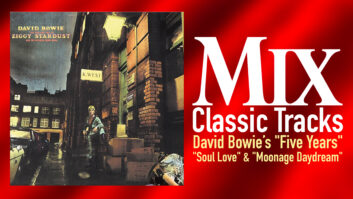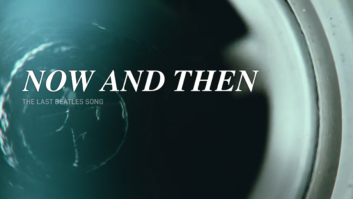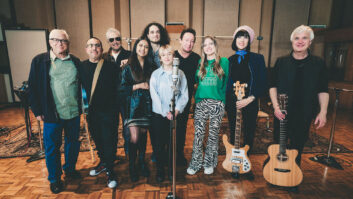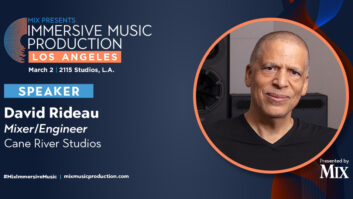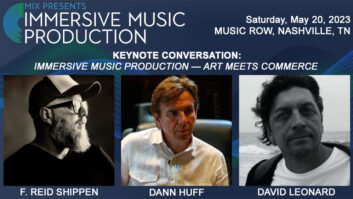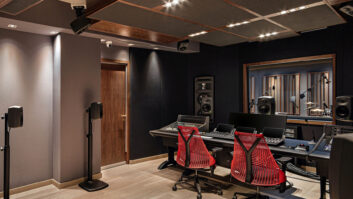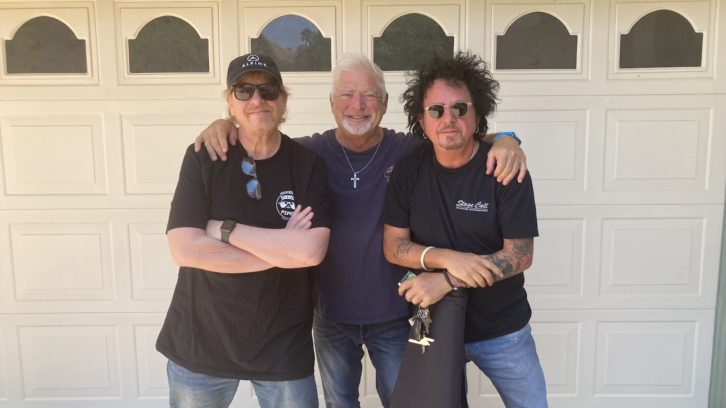
When composer/keyboardist David Paich was 17 years old, he was approached by Seals & Crofts producer Louie Shelton to record a solo album. Paich’s father, the illustrious arranger Marty Paich, put the kibosh on it.
“He told me I was not ready, and he would let me know when I was,” Paich explains. “My father was a great musician, so it had a lot of weight to it.”
Thirty-seven years later, on August 19, 2022, Paich released his first solo work, Forgotten Toys (plus a focus track, “Willibelongtoyou”), on the Mascot Label Group
Paich says he never felt the need to do such a project because being in Toto, which formed in 1977, “satisfied the itch. I was getting to sing, write and produce.” [Note: Paich is currently doing scattered dates with the band, as he has from the beginning.]
Not only did Toto scratch the itch, hits like “Hold the Line,” “Rosanna,” “Africa,” “I’ll Be Over You” and “I Won’t Hold You Back,” as well as the Grammy-sweeping Toto IV, gave Paich confidence for the day he would finally have some time to work on his own project.
Still, he did enlist a few Toto guys, like Steve Lukather and Lenny Castro, to play on a couple tracks. Joseph Williams, who was lead vocalist of the band in the late ’80s as well as currently, did some co-producing, co-writing, singing and engineering, basically helping to steer the ship. Williams says it was extremely gratifying to help Paich bring Forgotten Toys to fruition.
“It’s funny; we spend a lot of time with each other,” Williams says. “Despite the fact that we’re stuck on a bus together, Luke, Dave and I are still very close. It’s an honor to work with Paich. It was an honor to come into that band. I was a huge fan of that band.”
AT HOME WITH JOSEPH
Most of the songs on Forgotten Toys came from pieces of material Paich had been working on at various points in his career.
“The original name of the album was going to be Broken Toys because they were like broken apart pieces, like, ‘I’m dusting off a few old treasures,’” Paich explains. “None of the songs were finished until I started working seriously on them when the COVID pandemic started and I actually began piecing them together and finishing them up with Joseph.”
While many of the musicians recorded parts at their own studios, Paich worked out of his own ATS facility, which stands for Across The Street, essentially a 250-square-foot studio space carved out of two of the bays in his home’s five-car garage.
Classic Tracks: Toto’s “Africa”
Williams says they would get a song written as completely as possible, then start recording a mock-up. “I would start recording drums, or at least prepare a mock-up with as many finished-sounding keyboards and things as possible and jump right into vocals,” he explains. “It was sort of the COVID method, when nobody could go into the studio together and record. You would produce up a song as far as you could get it on computer, and then add real instruments after the fact.”
In his own home studio, Williams has a small writing and music production rig where he uses Apple Logic and a lot of Hans Zimmer’s samples. He typically would use drums from two or three different sample libraries; for keyboards, he likes to work with the Grandeur and Spectrasonics libraries.
“I use a lot of Universal Audio plug-ins for mixing, for ’verbs and stuff like that; Altiverb also,” Williams says. “I love all the Fabfilter stuff for compression. I have a Slate microphone that models all kinds of old tube microphones. There’s a plug-in that goes with it that you can get pretty close to the sound of a 47, a 67 or a 251. And I have a little mic, sort of podcast-style, over my rig so I can work out vocal parts right in front of the computer.”
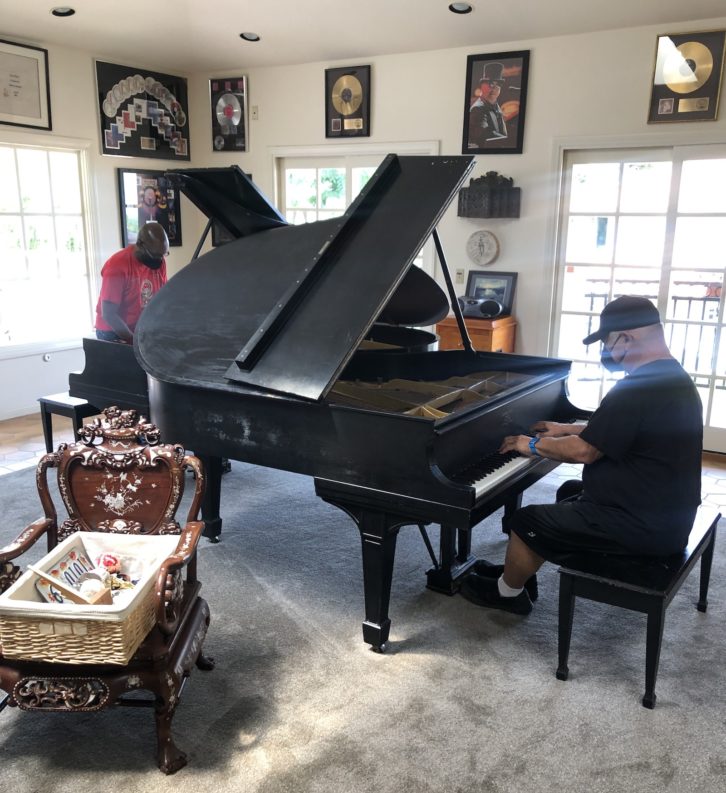
TRACKING WITH FRIENDS AND FAMILY
Williams got into engineering when he left Toto back in 1990. He got married a couple of years later and began to work as a TV composer on small-budget films for about 16 years.
“In the process of doing that, I put together a decent studio with the equipment of the time, which is very different from what we have now,” Williams says. “I didn’t really have an assistant, so I did all the engineering, second engineering and troubleshooting myself, and I learned my specific equipment so I could produce a score every week. That’s how that started. As time went on and computers became faster and smarter, and the sequencing software became more powerful, I just stuck with it and produced my own yacht-rock stuff and TV scores.”
Williams says Paich has several high-end mics at his studio: Neumann U67s, a U47 and a Telefunken 251 that he likes for his vocals. Williams will often use the 251 for his own vocals, but sometimes the 47, “because it dampens a little bit of the whinier high end from my voice,” he explains.
For Forgotten Toys, the background vocals were done in pieces. Williams did his at his studio and Paich sang his at ATS.
On the touching song “First Time,” about Paich’s daughter Elizabeth, she actually snuck into ATS one day and got her father’s assistant, Pat Knox (grandson of Tom Knox, who worked with Toto years earlier), to record a background vocal of her echoing her father singing “she’s in love” on the track.
Paich had written the structure and chorus several years back, and Williams helped him complete the song. They had kept the intro of the demo to retain the vibe, and when Elizabeth heard the song, she immediately could hear a background vocal in her head.
“I’m really happy she did,” Paich says. “It gives me goosebumps when I hear her voice come in.”
Including “All the Tears That Shine” on the record was bittersweet for Paich. The song was originally released on the 2015 album Toto XIV, written by Paich and musician Michael Sherwood, who passed away in 2019. The Toto version has Paich’s vocals, while Paich’s new version has Sherwood’s vocals. Paich apparently had started writing the song the day after Toto’s Falling in Between was completed in 2005, and he didn’t finish it until a couple of years later, with Sherwood’s help. He and Williams stripped the entire song down for Forgotten Toys.
“I wanted to honor him by putting it out with his vocal because it’s such a compelling, soulful vocal, and I felt it needed to be heard,” Paich explains. “So I stripped down the track of the demo and we put standup bass on it. Then we got Davey Johnstone from the Elton John band to play acoustic guitar, and Michael’s brother, Billy Sherwood, is singing some ad-libs on the end.”
“Lucy,” the last cut on the album, is a jazz instrumental. “That was the earliest one that was written by Mike Lang and me years back when we were trying to do an instrumental record together,” Paich recalls. “The first thing we cut was ‘Lucy,’ and we tried to do other things, but we were both busy and it never came to fruition. When I heard the other songs I had for this album, I wanted something totally different, and this was not like any of the other songs. It showed a different side of me that people hadn’t seen or heard, and I am really happy with the way it came out.”
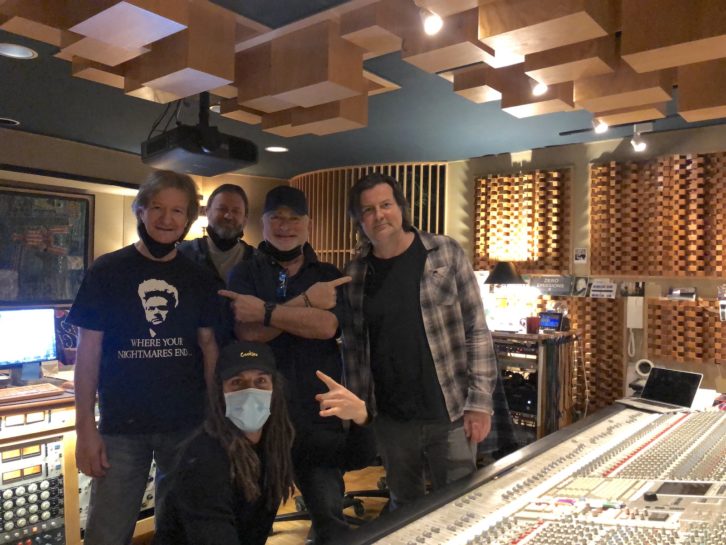
MIXING WITH BOB
Bob Clearmountain, who mixed the lion’s share of the album, laughs as he sums up the experience: “There’s a lot to it. David is a little over the top sometimes with his production.” That means there are a lot of instruments, and Clearmountain is working on his “old analog console,” an SSL 4000G+. “There’s a lot to weed through,” Clearmountain explains. ”But once you figure out what everything does, his arrangement sense is amazing; it all just works once you get everything doing the right things. It’s always fun to mix with him because there’s so much going on, and the arrangements are lush and beautiful.”
Clearmountain mixes at his private studio, Mix This!, and after his assistant, Brandon Duncan, first goes through a song and figures out how to get all the channels up on the desk, a rough mix is assembled.
“Then I’ll kind of go through each channel and figure out what all the instruments are doing,” Clearmountain explains. “I think of them almost like characters. I want to hear what the contribution is of each instrument and why it’s there.”
Once he had a good-sounding mix in his automation, he would invite Paich over to sit beside him. They went through all the tracks together so Paich could offer his suggestions, like, “Maybe the guitar should be a little bit louder.”
Do all artists do this? I ask. “No. A lot of them do,” Clearmountain replies. “Springsteen used to do that like crazy. He would put like 50 mixes on tape—back when we had tape—and then he’d go through them later and pick out the one he liked. He doesn’t do that anymore. David is great. He’ll sit there and we’ll try a bunch of different things, and we’ll get a mix in a day. And David’s comments are good. When he makes a comment, it’s, ‘Yeah, let’s check that out, yeah, that might be better. He’s really sharp.”
A lot of the echoes and delays on the record are from Clearmountain’s own plug-ins. “There’s another company called Altiverb that makes wonderful-sounding Impulse Responses—actual reverbs taken from churches and stadiums. I use that quite a bit.”
He also has a prized Neve 33609 compressor that he uses on bass, an Avalon AD 2055 also for bass, a UREI 1178 compressor (a stereo version of the 1176) which he likes on snare drum and tom toms and sometimes vocals, UREI LA-3As for vocals, Pultec EQP-1A3s for guitars and pianos, an SSL compressor for piano, a Lexicon PCM 70 vintage digital reverb that he uses on piano quite a bit, and Distressors on acoustic guitar.
“So much of it is in-the-box now,” he says. “Apogee plug-ins are the best. They try to keep all their products top secret, but for anybody reading this, Apogee plug-ins are the best. I use iZotope plug-ins a lot, too.”
While it is also available in stereo, Clearmountain says that he hopes people will have a chance to hear Forgotten Toys in Dolby Atmos, too.
Paich is extremely pleased with the finished product, and everyone’s already asking him about the next one, but he says he’s going to let this “marinate” for a little bit.
“It’s been a long time coming for this one, but I do hope to keep doing it,” he says, conceding that if his dad were still here, he would approve of the solo album and probably say, “You did okay, kid.”
